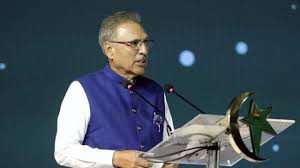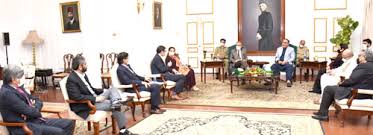President proposes ‘trade triangle’ of Pakistan, China & ASEAN for win-win prosperity

Islamabad: President Dr Arif Alvi on Friday proposed establishing a ‘trade triangle’ among Pakistan, China and Association of Southeast Asian Nations (ASEAN) to maximize the quantum of intra-regional business opportunities.

In his virtual address to the 17th China-ASEAN Expo (CAEXPO) held in China’s Nanning city, the President said Pakistan’s stable macro-economic policies and ease of doing business offered an attractive market to both China and the ASEAN countries for trade cooperation in diverse areas.
The four-day CAEXPO themed ‘Building the Belt and Road, Strengthening Digital Economy Cooperation’ kicked off in the capital of South China’s Guangxi Zhuang autonomous region on Friday. The expo hosted 11 high-level forums, over 160 trade promotion activities and 229 booths for participants from 22 countries including Pakistan.
President Alvi said despite the challenge of the coronavirus pandemic, Pakistan’s economy strengthened and its online businesses grew due to implementation of far-reaching economic reforms.
The President mentioned that Pakistan greatly learned from the experiences of China in establishing Special Economic Zones (SEZs) and invited the investors from ASEAN and China to explore Pakistan’s business potential.
“We encourage the ASEAN countries and the Chinese businessmen to invest in SEZs as Pakistan’s macro-economic policies have changed tremendously with an improved state of ease of doing business,” he said.
Dr Alvi said Pakistan was making great progress after moving on from the original course of China Pakistan Economic Corridor, i.e. energy and infrastructure, to other areas of cooperation including agriculture, industries and socio-economic reforms.
He mentioned that the second phase of Free Trade Agreement between Pakistan and China Pak was in place since January this year, while Pakistan had a sectoral dialogue partnership with ASEAN with increased mutual cooperation.
“We want to do a feasibility where Pakistan, China and ASEAN trade triangle can come up as well as feasibility into a Free Trade Agreement between Pakistan and ASEAN,” he said, stressing that such intra-regional arrangement could lead to prosperity.
On exports to ASEAN and China, he said, textiles, food produce including meat and vegetables, surgical goods, minerals and Information Technology could be the prospective areas. Also, Pakistan produced best sports goods with its footballs used in several FIFA world cups, he added.
President Alvi recalled that China recently signed the world’s largest trade agreement – Regional Comprehensive Economic Partnership – with a number of countries and emerged as a reliable trading partner and economic hub.
On Pakistan-China relationship, he said the trusted bond was based on a friendship which was “deeper than oceans and higher than skies”.
He said CPEC had done wonders by turning Pakistan into an economic and strategic hub that provided an easy and fast route for transportation of goods from China and Central Asia to the sea.
President Alvi lauded the 14 enterprises from Pakistan participating in CAEXPO and expressed confidence that the activity would support an increased trade activity among Pakistan, China and the ASEAN countries.
“This expo symbolically shows that China, beyond COVID-19, has provided leadership to the world in the area of trade,” he said.
The CAEXPO being held at Nanning International Convention and Exhibition Centre has been co-sponsored by China’s Ministry of Commerce and its counterparts in the 10 ASEAN member states as well as the ASEAN Secretariat.
Pakistan is participating in the 17th CAEXPO as a Special Partner for the first time and is making full spectrum representation through country pavilion, commercial display booths and an exclusive trade and investment conference on the sidelines.
President Alvi’s video speech was released together with speeches of Chinese President Xi Jinping and ASEAN leaders including the Presidents of Indonesia, Myanmar and the Philippines and Prime Ministers of Thailand, Vietnam, Laos and Cambodia.





